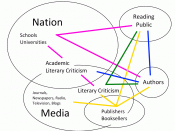Formalist Criticism: All the basics necessary for understanding the work are limited within the work by itself. What is most noticeable of the formalist critic are the basics of form-style, structure, tone, imagery, etc.-that are found throughout the text. The key for formalist critics is to determine how such elements work together with the text's subject to shape its effects upon readers.
Biographical Criticism: This is a more practical method by which readers can better understand a text. However, a biographical critic must be careful not to take the biographical facts of a writer's life too far in criticizing the works of that writer: the biographical critic focuses on clarifying the literary information by using insight from the author's life of experienceâ¦like a guide.
Historical Criticism: This approach helps the reader by trying to re-create the work to modern times to make it easier to understand, but also have the same effect just as the original audience.
A key goal for historical critics is to understand the effect of a literary work upon its original readers.
Psychological Criticism: This approach reflects the effect that modern psychology has had upon both literature and literary criticism. This approach it's more diverse, and it splits into three categories: Investigates the creative process of the arts, the psychological study of an artist, and the analysis of characters.
Gender Criticism: This approach shows how sexual identity persuades a person to view ones literary art work. The bulk of gender criticism, however, is feminist and takes as a central precept that the chauvinistic attitudes that have dominated in literature "full of unexamined 'male-produced' assumptions." Sociological Criticism: This explores the relationships between the artist and society. Sometimes it examines the artist's society to better understand the author's literary works; other times, it may examine the representation...


